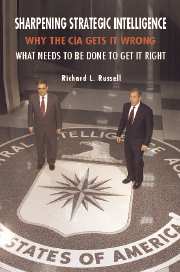 Sharpening Strategic Intelligence
Sharpening Strategic Intelligence Book contents
- Frontmatter
- Contents
- Acknowledgments
- Sharpening Strategic Intelligence
- 1 Strategic Intelligence and American Statecraft
- 2 Debunking Cold War Myths
- 3 Stumbling after the Cold War
- 4 Blundering in the “War on Terrorism”
- 5 Spies Who Do Not Deliver
- 6 Analysts Who Are Not Experts
- 7 Facing Future Strategic Intelligence Challenges
- Notes
- Selected bibliography
- Index
6 - Analysts Who Are Not Experts
Published online by Cambridge University Press: 26 July 2009
- Frontmatter
- Contents
- Acknowledgments
- Sharpening Strategic Intelligence
- 1 Strategic Intelligence and American Statecraft
- 2 Debunking Cold War Myths
- 3 Stumbling after the Cold War
- 4 Blundering in the “War on Terrorism”
- 5 Spies Who Do Not Deliver
- 6 Analysts Who Are Not Experts
- 7 Facing Future Strategic Intelligence Challenges
- Notes
- Selected bibliography
- Index
Summary
The cia's failures in strategic intelligence during the Cold War, post–Cold War, and 9/11 periods do not solely lay at the doorstep of poor human intelligence. Analysis, another core mission of the Agency, also bears a heavy burden for these intelligence failures. Just to tick off a few blunders, the CIA's analysts failed to warn of the intervention of Chinese forces in the Korean War, mistakenly judged that the Soviet Union would not be so “foolish” as to deploy nuclear-tipped ballistic missiles in Cuba, failed to predict that India would test a nuclear weapon in 1998, and completely misjudged the status of Iraq's weapons of mass destruction (WMD) programs in the run-up to the Iraq War.
The CIA has fallen a long way from where the father of strategic intelligence in the United States, Sherman Kent, wanted it to be. Kent envisioned an analytic corps in the CIA that would be akin to a major university's faculty with the research skills needed to exploit clandestine and public literature. Kent argued that strategic intelligence required “people to whom research and rigorous thought are the breath of life, and they must accordingly have tolerance for the queer bird and the eccentric with a unique talent. They must guarantee a sort of academic freedom of inquiry and must fight off those who derogate such freedom by pointing to its occasional crackpot finding. They must be built around a deference to the enormous difficulties which the search for truth often involves.”
- Type
- Chapter
- Information
- Sharpening Strategic IntelligenceWhy the CIA Gets It Wrong and What Needs to Be Done to Get It Right, pp. 119 - 148Publisher: Cambridge University PressPrint publication year: 2007


